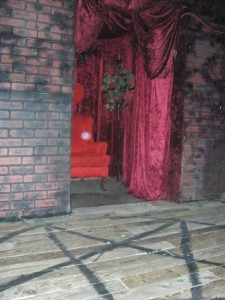By- DeAnn Thomas
Nothing strikes fear and mistrust into the heart of my mother, or most people, when they

Orb
hear the word “Demonology”. I even find that when I tell anyone about it, I rush to explain what it is before they run backwards, groping for a vial of holy water to throw on me. People forget that the suffix “ology” means “the study of” and quickly assume that it all has to do with Satan worship. (Satanism is a name for a diverse group of religions which regard demons in general and Satan in particular as positive entities, either as real entities to be worshiped (Theistic Satanism), or using Satan and other demons as symbols (LaVeyan Satanism).
The definition in Wikipedia states, “Demonology is the systematic study of demons or beliefs about demons. “
Demons are a thing of antiquity. They have been found in all times, and all places, many believe that they are what people of old called “magicians” or at least the people who let themselves fall under their (a demon’s) influence. People think they don’t exist anymore, but be careful, they do. It seems that for a while, they may have faded into the background, waiting, biding their time, but studies have shown that there is a resurgence of demonic activity.
Demonology, as opposed to “ghosts” carries a much heavier theological aspect. It deals mostly with fallen angels and how they are on Earth to tempt and torment us. One thing is evident; they seem to span all religions, not just Christianity. One thing to note, Clergy can be demonologists, but one doesn’t have to be clergy to be a demonologist.
“The term demonologist often conjures up the thought of summoning demons, and understandably so, as there are different types of demonologists. The Biblical demonologist, however, studies demons from a theological standpoint – not a magical one. He studies how mankind is affected by them and intercedes on the behalf of those influenced or held captive by them. A religious demonologist systematically studies demons and devils and beliefs about the same, their powers, limitations, origins, reason for existence, etc. It is the branch of theology relating to those beings that occupy the demonic realm of the spirit world. In stark contrast to the occult demonologist’s intent and purpose, a religious demonology studies for the exclusive purpose of elimination. “ (credit to Chesterfield Paranormal Research)
How does one become a demonologist? Well, after looking around on the computer to answer this question for this article, every different religion has a different set of “pre-requisites”, so if it’s something you’re interested in, look to your own religious affiliation first, then branch out to the general community if that doesn’t pan out the way you’d like. Read up on it first, make sure it’s something that you are willing to do because once you get in, it can be exceptionally dangerous work.
There are many things that demonologists look for and study. Just a few are things like, why? What are some of the signs of demon infestation, activity, or possession, how to rid one of a demon, etc. (These will all be addressed more fully in subsequent articles.)
Demons can attack you violently, without much warning or they can infest you slowly. I have seen both cases. I was actually the target of a slow infestation. When this is the case, they weave a web of lies, make things look pretty, give you anything you want, until BAM! They have you, and they can do this without you knowing. The only clue is the nagging in your head that something just isn’t quite right. I was lucky and was able to recognize it for what it was before it was fully infested.
Demons are not something to mess with. Too many people think that the dangers aren’t real, that it is made up, to the point that even a popular game company made a Ouija board game. This is not a game, it is real, and it is dangerous. I do not suggest playing or experimenting with this in any way, shape, or form, bad things WILL happen and you’ll be calling a demonologist for help.
It is definitely an interesting field of study. You can get involved as an actual demonologist, or just enough to know when to call one in. In either case, do your homework, know the signs, and be careful!
